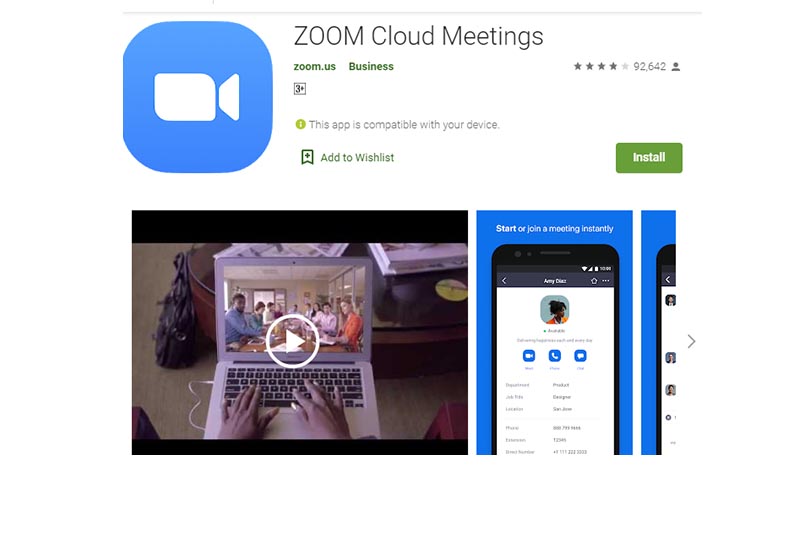Zoom bombing disrupts virtual meetings and online classes
Kathmandu, May 22
It has been around two months that the country is in a lockdown with literally everything shut. However, some offices and schools have been conducting online meetings and classes, respectively, during this period. But the problem is that with the increasing use of online methods of communication, incidents of online harassment have been on the rise.
Female networks targeted
On May 16, the Female Foresters Network (FFN) had organised a meeting on the Zoom platform with participation of around 278 females, including a few international delegates. However, the webinar was hacked by spammers and it was flooded with pornography videos and vulgar Nepali words.
“We could clearly hear the voice of a boy using vulgar words and after a while some adult videos appeared in the webinar,” said Deepa Oli, member of FFN, adding, “This was our third webinar on Zoom and we had never faced such incidents in the previous ones.”
However, despite the incident, FFN continued with the webinar that day.
According to Oli, the male voice that they heard was also speaking derogatory words against feminism. “It was clear that the spammer was targeting female networks and what he did is an example of online harassment of females,” she said.
“Such types of videos had appeared during webinars organised by some of my friends previously but the disparaging words used against women in our webinar reveal the toxic mentality of the spammer,” stated Oli.
She further mentioned that a few males have been harassing females in this manner for their entertainment.
Despite using a corporate account, Zoom bombing had affected the FFN webinar.
“FFN was using a corporate account and we had paid for the services, yet we faced such an incident,” she said. “Our internal team is tracing the spammers and once we find any clue, we will go to the police and file a case.”
Similarly, on the same day itself, Digital Samvad had also faced Zoom bombing during its webinar related with digital payment features and its future in Nepal, where leading IT professionals of the country were participating.
Students not spared either
Meanwhile, another FFN member, Apsana Kafle, had also faced Zoom bombing during her college webinar. “A few days back, our college webinar on Zoom meeting application had been hacked by spammers and porn videos started appearing on our screens,” she said, adding, “Such incidents cause mental trauma for some students.”
According to her, some of her juniors could not sleep due to anxiety and one of them even puked after the incident.
“The videos were disgusting yet we were able to control the spammers and the meeting continued,” Kafle said. “Such attacks have been increasing in recent times and most of the times the spammers target female users,” she added.
According to her females have been facing such harassment not only on the Zoom platform but on other social media platforms too.
And Zoom bombing has not been limited to webinars only but during online classes too.
A young student named Manish Sharma who is preparing for his SEE and attending virtual classes conducted by his school encountered such an incident on Zoom on May 18.
“There were 23 students in the online class and we were revising our courses,” he said, adding, “But suddenly some adult pictures were displayed on our screen accompanied by some weird language which we could not understand.”
The session was terminated after that incident and since then his school has halted online classes until further notice.
Two weeks ago, another student of grade two was taking his online class when he encountered the Zoom bombing. “That morning my little brother was taking online classes with around 10 or 15 friends. Suddenly a porn site popped up on the screen and as soon as I saw that I closed the meeting,” the victim’s sister narrated. “However, it was quite scary and such incidents could have a negative impact on young minds,” she added.
Caution needed
Meanwhile, Gunakeshari Pradhan, chairperson of Women in Information and Technology, says that lack of awareness about information and technology is creating this problem.
“Hacking and spamming were never minor issues even during normal days. However, during the lockdown virtual meetings and classes are being conducted increasingly due to which such activities have also gone up and we have become aware about them.”
She, however, said that hacking incidents occur at times because the spammer wants to have some fun and at times it is deliberately done to disturb the meeting.
Pradhan further explained that most of the spammers are young boys who do it for fun but there are incidents when professionals are involved.
“To avoid such accidents we have to be careful while organising virtual meetings,” she said, adding, “Passwords and meeting links should not be shared publicly and other safety measures must be adopted.”
Even when such incidents have risen, the government announced on May 5 that official meetings would be conducted through Zoom.
Regarding this issue, the Department of Information Technology has said that it is preparing long-term solutions to control such activities, while the Central Cyber Bureau did not respond to The Himalayan Times regarding this issue despite several attempts.
A version of this article appears in e-paper on May 23, 2020, of The Himalayan Times.






